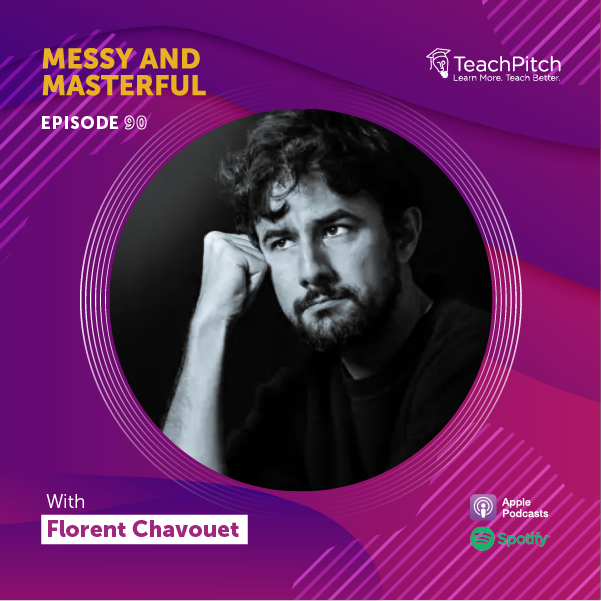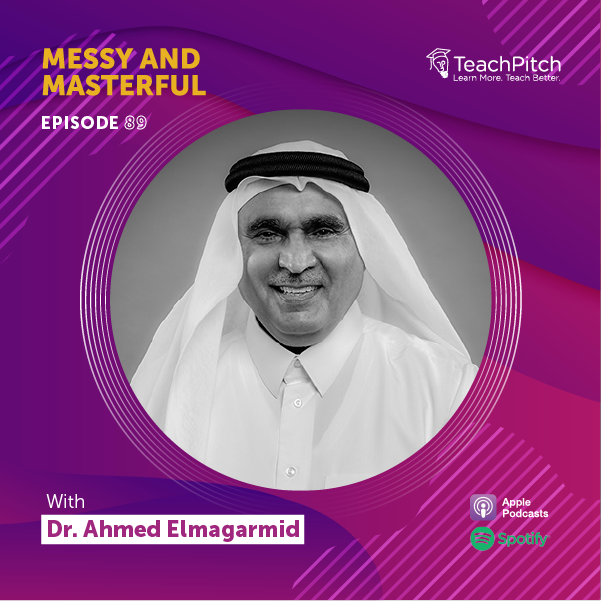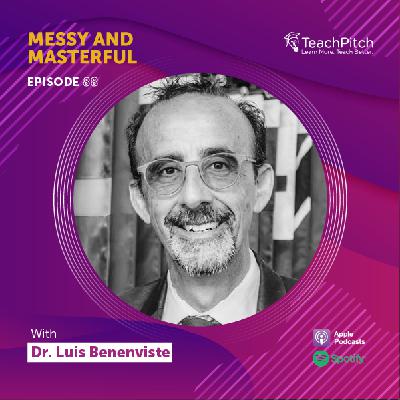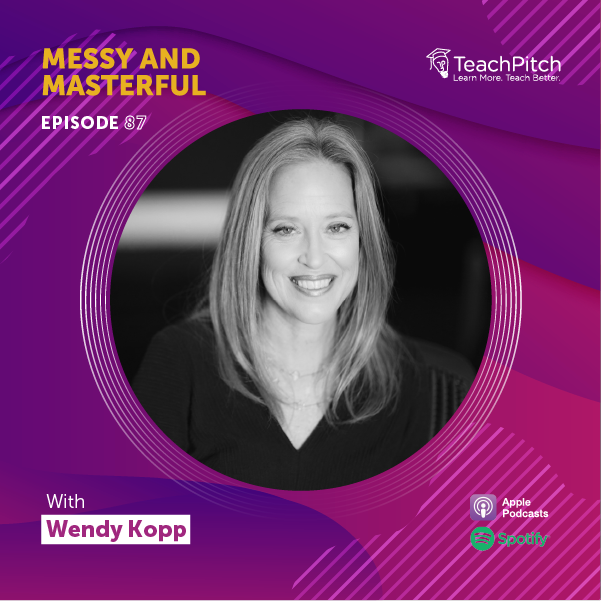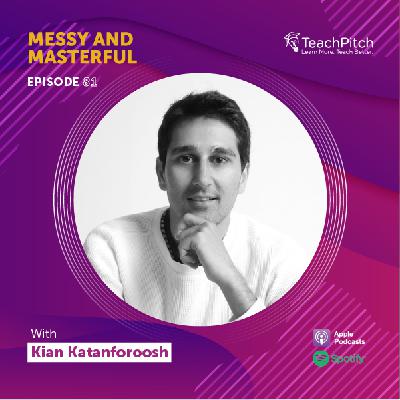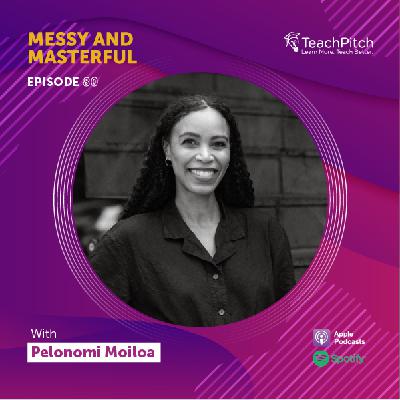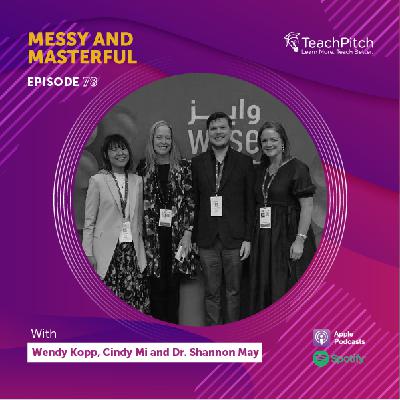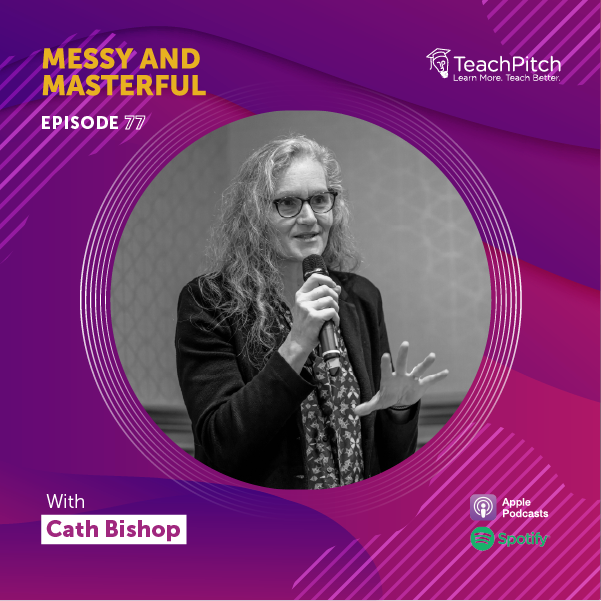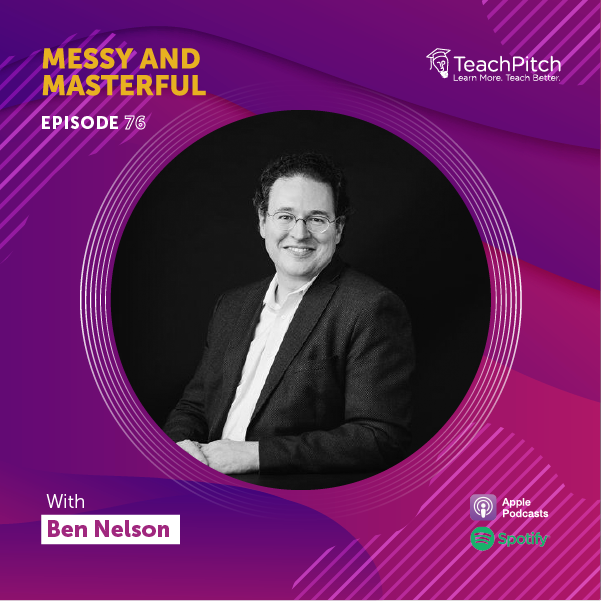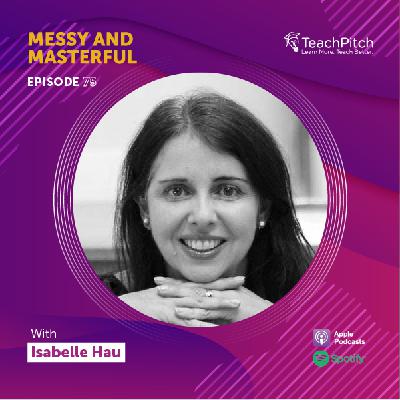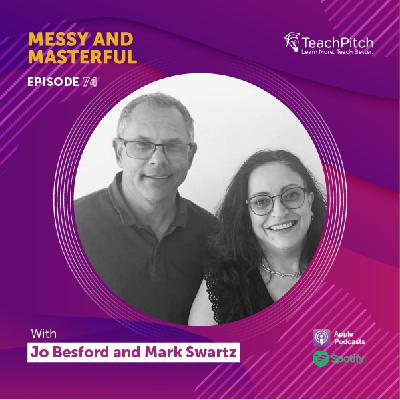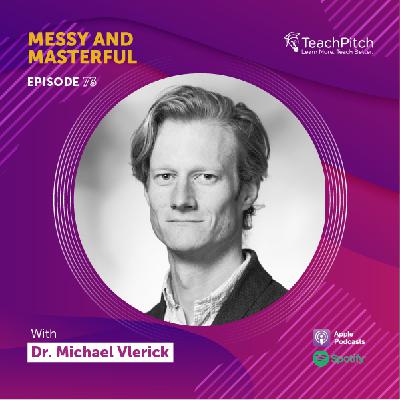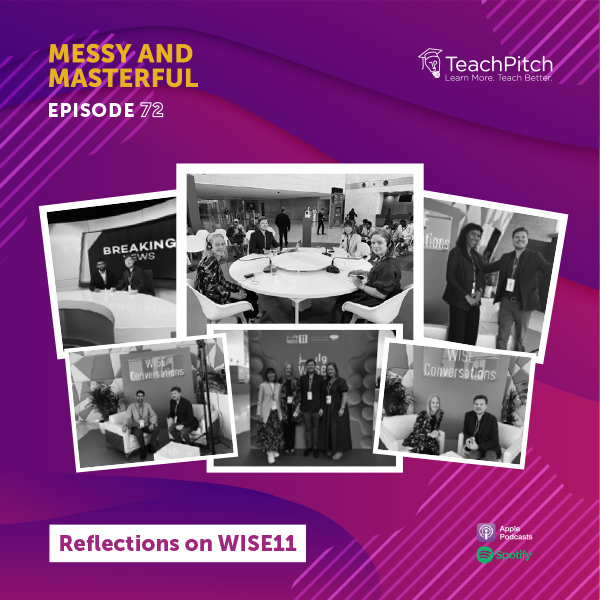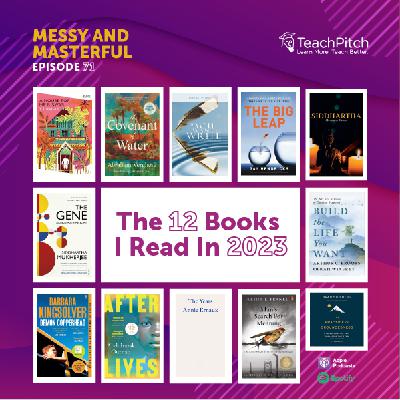Discover Messy and Masterful
Messy and Masterful

Messy and Masterful
Author: Aldo de Pape
Subscribed: 4Played: 33Subscribe
Share
© Copyright @ 2021 AsWeGrow Ltd., UK. All rights reserved.
Description
TeachPitch Founder Aldo de Pape interviews people from a variety of professional circles from all over the world how they overcame deep personal challenges and managed to achieve great professional success.
100 Episodes
Reverse
In this episode of Messy and Masterful, Aldo de Pape interviews artist and author Florent Chavouet, who shares his journey from a budding artist to a successful author of travel books, particularly focusing on his experiences in Japan. The conversation delves into the impact of his first book, 'Tokyo on Foot', the evolution of his career, and his creative process. Florent discusses the balance between commercial projects and personal artistic endeavors, as well as his aspirations for future works, including a focus on the ordinary aspects of life in Japan. The episode highlights the importance of storytelling in art and the personal connections that shape an artist's work. Takeaways Florent's journey to Japan was driven by curiosity and a desire to explore. His book 'Tokyo on Foot' was a portfolio that unexpectedly became a bestseller. The success of his first book opened doors to various creative projects. Florent values the freedom to choose projects that interest him. He prefers to create books that reflect his personal experiences rather than follow trends. His work often focuses on the ordinary aspects of life, providing a unique perspective. Florent's artistic process involves detailed sketches that capture the essence of his surroundings. He aims to balance his work between books and gallery exhibitions. Florent is motivated to continue creating to avoid being forgotten by his audience. He believes in the importance of personal stories in art, which resonate with readers. You can look at the incredible work of Florent here: http://florentchavouet.blogspot.com
In this conversation, Dr. Ahmed Khalifa Elmagarmid talks to Aldo about the role of artificial intelligence in education, its evolution, and the impact of generative AI. He emphasizes the importance of balancing innovation with regulation, the potential of AI in healthcare, and the need for ethical development. The discussion also touches on the challenges of misinformation in the digital age and the necessity for continuous education and adaptation in the workforce. Takeaways WISE is a global event focused on advancing education. Generative AI represents a significant leap in AI capabilities. AGI is still a distant goal, not achievable in the near future. AI will create new jobs even as some become obsolete. AI can enhance healthcare, but won't replace professionals. Regulation of AI is necessary but should not stifle innovation. Misinformation is a growing concern in the age of AI. Ethical AI development is crucial for societal benefit. Continuous education is essential in a rapidly changing job market. Personal experiences shape one's perspective on technology and education.
In this conversation, Aldo de Pape interviews Dr. Luis Benenviste, the Director of Global Education at the World Bank, discussing the organization's role in global education, the importance of foundational skills, and the impact of AI on future learning. Dr. Benenviste shares his personal journey into education, the challenges of the learning crisis, and the need for equitable access to quality education. The discussion emphasizes the transformative power of education and the necessity of adapting to a rapidly changing world. Takeaways The World Bank aims to fight poverty and reduce inequality. Education is crucial for personal and societal growth. Dr. Benenviste's journey reflects the importance of adaptability. Foundational skills are essential for future success. AI presents both opportunities and risks in education. Two-thirds of children in developing countries face learning poverty. Quality education can empower individuals to realize their potential. The World Bank funds initiatives to improve education globally. Curiosity is a key driver of knowledge and understanding. Life's journey is non-linear; continuous learning is vital.
In this conversation, Aldo interviews Wendy Kopp, founder of Teach for America and Teach for All, discussing her journey in Education Reform. Wendy shares her motivations for starting Teach for America, the impact of two-year teaching commitments, and the global expansion of her initiatives. The conversation also touches on the challenges of education in crisis situations, the role of social media in mobilizing for social good, and the concept of human flourishing in education. Wendy reflects on her experiences and the importance of collective leadership in fostering change. Takeaways Wendy Kopp'ss journey began with a thesis idea that evolved into a lifelong commitment to education. The initial recruitment efforts for Teach for America highlighted the disparity in how society values teaching compared to corporate careers. The two-year commitment model has proven effective in creating long-term change makers in education. Teach for All was established to facilitate global learning and collaboration among independent organizations in different countries. Local organizations play a crucial role in responding to educational crises, especially in conflict zones. Social media is a tool, but personal relationships remain essential for mobilizing young leaders for education. Human flourishing in education encompasses agency, self-awareness, empathy, and critical thinking skills. Wendy emphasizes the importance of understanding the pressures faced by future leaders in education. The concept of collective leadership is vital for fostering change within organizations and communities. Wendy's reflections on her journey highlight the fulfillment derived from being part of a global community committed to education. You can find out more about Wendy's incredible work here: https://teachforall.org
Dr. Michael Vlerick presents a concrete 10 step plan on how to become a happier person! He emphasizes the need to develop good habits and discard bad habits, starting with small changes and being kind to ourselves. Living a healthy lifestyle, including getting enough sleep, eating well, and exercising, is crucial for both physical and mental well-being. Meditation is also highlighted as a powerful tool for rewiring the brain and freeing ourselves from negative mental reactions and cravings. In this conversation, Michael Vlerick and Aldo de Pape discuss the final 10 steps to becoming happier. These steps include observing mental reactions without reacting, developing contentment and gratitude, engaging in flow activities, investing in social relationships, and not making happiness the direct goal. They emphasize the importance of training the mind to wander less and be more present, as well as the benefits of altruism and helping others. They also discuss the negative impact of mindless relaxation activities and the importance of focusing on the present moment. Takeaways Understand your genetic programming and the stick and carrot principle to achieve happiness. Develop good habits and discard bad habits, starting with small changes and being kind to yourself. Live a healthy lifestyle, including getting enough sleep, eating well, and exercising, for both physical and mental well-being. Use meditation as a powerful tool to rewire the brain and free yourself from negative mental reactions and cravings. Observe mental reactions without reacting and extend this practice to daily life Develop contentment and gratitude for a deeply satisfying life Engage in flow activities instead of mindless relaxation Invest in social relationships and practice altruism Don't make happiness the direct goal, focus on equanimity, contentment, and loving interactions --- Become an Audible Member for only 99 pence for 3 months: https://bit.ly/3vzSox9 Riverside.fm: get a 15% discount by using the code MESSY or sign up here https://bit.ly/3HCU4IC Register to Receive Books for £1 from Scholastic:https://bit.ly/49lRimq Leading the Circular Fashion Revolution with Preworn: Get a 25% discount using the code MESSY25: https://bit.ly/49bEXlD Cold Case Inc (use the code MESSY and get an exclusive 15% discount): https://bit.ly/3HN75PD Connect with the Brands you love at Awin:https://bit.ly/3vzSvJ5 Find the Perfect Gardener on Care.com: https://bit.ly/4cLKcdZ Grown Alchemist: https://bit.ly/3vKGXCD Cake or Death: https://bit.ly/3J4tDfG Kids Party Craft: https://bit.ly/4cFrULj Bike Club: https://bit.ly/3xj7DuF The Code Zone: https://bit.ly/3UlspmU
In this conversation, Aldo and Dr. Michael Vlerick discuss the topic of happiness and how to train the brain for happiness. They explore the importance of remaining equanimous, developing contentment, and connecting with others in order to live a happy and meaningful life. They also delve into the practice of meditation and its benefits, including training attention, gaining insight into one's psychology, and developing a new relationship with thoughts and emotions. The conversation emphasizes the transformation of the experience of life through mindfulness and detachment from emotions. In this conversation, Michael and Aldo discuss the importance of meditation in training the brain for happiness. They explore different types of meditation, how to get started with meditation, and the benefits of cultivating positive states of mind. They introduce the Saber protocol as a tool for managing negative mental reactions and offer practical advice for implementing it in daily life. They emphasize the importance of practicing gratitude and cultivating contentment to enhance happiness. Takeaways: Remaining equanimous, developing contentment, and connecting with others are important pillars for living a happy and meaningful life. Meditation is a practice that involves manipulating attention and can lead to a transformation of the experience of life. Through meditation, one can train attention, gain insight into their own psychology, and develop a new relationship with thoughts and emotions. Detachment from emotions allows for a greater appreciation of both positive and negative feelings, without clinging or craving for them to last. The quality of life is more determined by the attention one brings to the present moment than by external circumstances. Meditation is a powerful tool for training the brain and rewiring mental patterns. Different types of meditation, such as concentration, mindfulness, and cultivation meditation, offer various benefits for happiness and well-being. The Saber protocol (Stop, Accept, Bring attention, Examine, Release) can help manage negative mental reactions and promote emotional freedom. Practicing gratitude and cultivating contentment are essential for enhancing happiness. Training the brain for happiness requires daily practice and a commitment to observing and transforming negative mental reactions. --- Become an Audible Member for only 99 pence for 3 months: https://bit.ly/3vzSox9 Riverside.fm: get a 15% discount by using the code MESSY or sign up here https://bit.ly/3HCU4IC Register to Receive Books for £1 from Scholastic:https://bit.ly/49lRimq Leading the Circular Fashion Revolution with Preworn: Get a 25% discount using the code MESSY25: https://bit.ly/49bEXlD Cold Case Inc (use the code MESSY and get an exclusive 15% discount): https://bit.ly/3HN75PD Connect with the Brands you love at Awin:https://bit.ly/3vzSvJ5 Find the Perfect Gardener on Care.com: https://bit.ly/4cLKcdZ Grown Alchemist: https://bit.ly/3vKGXCD Cake or Death: https://bit.ly/3J4tDfG Kids Party Craft: https://bit.ly/4cFrULj Bike Club: https://bit.ly/3xj7DuF The Code Zone: https://bit.ly/3UlspmU
In this conversation, Aldo de Pape and Dr. Michael Vlerick discuss the simple recipe for happiness. They explore the three major elements of a happy life: equanimity, contentment, and the quality of social connections. They emphasize the importance of working on oneself and cultivating a new relationship with negative emotions. They also discuss the illusion of control and the illusion of self, highlighting the liberating potential of understanding these concepts. The conversation touches on the parallels between human consciousness and artificial intelligence. In this conversation, Dr. Michael Vlerick discusses the illusion of self and the liberating effect of dispelling this illusion. He explains how understanding the constant flow of experiences in life can free us from unnecessary suffering. Dr. Vlerick emphasizes the importance of equanimity, accepting what we cannot change, and cultivating contentment. He also highlights the profound impact of social connections on our wellbeing and happiness. The conversation concludes with a discussion on implementing practices to reprogram the brain and enhance happiness. Takeaways The three major elements of a happy life are equanimity, contentment, and the quality of social connections. Working on oneself and cultivating a new relationship with negative emotions can lead to greater happiness. The illusion of control and the illusion of self can contribute to unhappiness. Understanding the parallels between human consciousness and artificial intelligence can provide insights into the nature of the self. Understanding the illusion of self can lead to a more liberating and freeing experience of life. Equanimity, accepting what we cannot change, and cultivating contentment are key elements of happiness. Social connections play a crucial role in our wellbeing and happiness. Implementing practices to reprogram the brain can enhance happiness and improve overall wellbeing. --- Become an Audible Member for only 99 pence for 3 months: https://bit.ly/3vzSox9 Riverside.fm: get a 15% discount by using the code MESSY or sign up here https://bit.ly/3HCU4IC Register to Receive Books for £1 from Scholastic:https://bit.ly/49lRimq Leading the Circular Fashion Revolution with Preworn: Get a 25% discount using the code MESSY25: https://bit.ly/49bEXlD Cold Case Inc (use the code MESSY and get an exclusive 15% discount): https://bit.ly/3HN75PD Connect with the Brands you love at Awin:https://bit.ly/3vzSvJ5 Find the Perfect Gardener on Care.com: https://bit.ly/4cLKcdZ Grown Alchemist: https://bit.ly/3vKGXCD Cake or Death: https://bit.ly/3J4tDfG Kids Party Craft: https://bit.ly/4cFrULj Bike Club: https://bit.ly/3xj7DuF The Code Zone: https://bit.ly/3UlspmU
In this conversation, Dr. Michael Vlerick discusses the mismatch between our modern environment and our Stone Age brains, which can impact our happiness. He highlights examples such as our predilection for sugary and fatty foods, our stress response, our sedentary lifestyle, and the artificial ways we seek dopamine boosts. Dr. Vlerick explains how our brains evolved to seek opportunities and rewards, but our modern environment often provides excessive and unhealthy stimuli. He also touches on the addictive nature of social media and the importance of cultivating attention and quieting the mind. The conversation explores the negative consequences of overusing social media, the complex nature of addiction, the role of environment in addiction, the prevalence of loneliness in modern times, the mismatch between our natural responses and the modern world, the possibility of adapting to the modern environment, the importance of habit formation, gratitude for modern living conditions, and looking forward to increasing happiness. Takeaways Our modern environment often clashes with our Stone Age brains, leading to mismatches that can impact our happiness. Examples of mismatches include our predilection for sugary and fatty foods, our stress response, our sedentary lifestyle, and the artificial ways we seek dopamine boosts. Understanding the evolutionary purpose of certain behaviors can help us navigate the challenges of our modern environment. Cultivating attention and quieting the mind are important for our well-being in an environment filled with distractions. Overuse of social media can have negative consequences, especially in young people, leading to depression and social isolation. Addiction is a complex phenomenon influenced by both chemical compounds and environmental factors. The environment plays a crucial role in addiction, as seen in studies with rats and the experiences of soldiers in the Vietnam War. Loneliness is a major problem in modern times, with one-third of adults suffering from it. Our natural responses and instincts are often mismatched with the modern world, leading to challenges in maintaining happiness. Adapting to the modern environment requires knowledge and caution. Habit formation is key to protecting against threats to happiness and increasing long-term well-being. Despite the challenges, it is important to be grateful for the improved living conditions in modern times. There are strategies and solutions to increase happiness and improve overall well-being. --- Become an Audible Member for only 99 pence for 3 months: https://bit.ly/3vzSox9 Riverside.fm: get a 15% discount by using the code MESSY or sign up here https://bit.ly/3HCU4IC Register to Receive Books for £1 from Scholastic:https://bit.ly/49lRimq Leading the Circular Fashion Revolution with Preworn: Get a 25% discount using the code MESSY25: https://bit.ly/49bEXlD Cold Case Inc (use the code MESSY and get an exclusive 15% discount): https://bit.ly/3HN75PD Connect with the Brands you love at Awin:https://bit.ly/3vzSvJ5 Find the Perfect Gardener on Care.com: https://bit.ly/4cLKcdZ Grown Alchemist: https://bit.ly/3vKGXCD Cake or Death: https://bit.ly/3J4tDfG Kids Party Craft: https://bit.ly/4cFrULj Bike Club: https://bit.ly/3xj7DuF The Code Zone: https://bit.ly/3UlspmU
In this conversation, Aldo and Michael discuss the importance of happiness in life and how it becomes more apparent when reflecting back on one's life. They explore the idea that everything we do is ultimately in pursuit of happiness, whether consciously or unconsciously. They also discuss the need to be more conscious of our actions and behaviors and how they contribute to our long-term happiness. The conversation touches on the role of mourning and the coexistence of happiness and sadness. Overall, the conversation emphasizes the importance of living a life that encompasses all emotions and finding beauty and meaning in each experience. Keywords: happiness, reflection, life, actions, behaviours, mourning, sadness, beauty, meaning Takeaways Happiness is the currency of life and becomes more apparent when reflecting back on one's life. Everything we do, consciously or unconsciously, is in pursuit of happiness. Being conscious of our actions and behaviors can contribute to our long-term happiness. Mourning can coexist with happiness and bring beauty and meaning to life. Sound Bites "I want you all to know that I was very happy." "Everything we do, everything we pursue in life, directly or indirectly, consciously or unconsciously, is to make us and other people happier." "We can radically transform our lives for the better, but it won't happen without a kind of conscious effort." A big thanks to all our Partners who make Messy & Masterful happen: Become an Audible Member for only 99 pence for 3 months: https://bit.ly/3vzSox9 Riverside.fm: get a 15% discount by using the code MESSY or sign up here https://bit.ly/3HCU4IC Register to Receive Books for £1 from Scholastic: https://bit.ly/49lRimq Creative Learning and Wellbeing for Kids with Brilliant Brainz Magazine: https://bit.ly/3PNjrM8 Leading the Circular Fashion Revolution with Preworn: Get a 25% discount using the code MESSY25: https://bit.ly/49bEXlD Cold Case Inc (use the code MESSY and get an exclusive 15% discount): https://bit.ly/3HN75PD Connect with the Brands you love at Awin: https://bit.ly/3vzSvJ5 Find the Perfect Gardener on Care.com: https://bit.ly/4cLKcdZ Grown Alchemist: https://bit.ly/3vKGXCD Cake or Death: https://bit.ly/3J4tDfG Kids Party Craft: https://bit.ly/4cFrULj Bike Club: https://bit.ly/3xj7DuF The Code Zone: https://bit.ly/3UlspmU
In this conversation, Aldo interviews Kian Katanforoosh, CEO of Workera; a platform that measures competencies and provides insights in how people can acquire the right job skills for the future. The two discuss the impact of AI on jobs and the future of work, and dive into how important it is to prepare our world for all the changes that are to come. They also touch on the role of AI in different fields and the need for both durable and perishable skills. Kian shares his personal journey coming from France to the United States, working and growing at Stanford University, and reveals why he is so passionate about Education. Check out Workera's website to find out more about the great work they do: https://workera.ai/ This Episode is made in partnership with: Cold Case Inc (use the code MESSY and get an exclusive 15% discount): https://bit.ly/3HN75PD Riverside (get a 20% discount by signing up via this link): https://bit.ly/3HCU4IC Preworn: Get a 25% discount using the code MESSY25: https://bit.ly/49bEXlD The Code Zone: https://bit.ly/3UlspmU
Aldo talks to Pelonomi Moiloa, CEO and co-founder of Lelapa AI and discusses the importance of building language models for African languages and the challenges faced in using models built in other places. Pelonomi emphasizes the need to make AI accessible for everyone and explains how Lelapa AI is working towards that goal. Pelonomi shares her background and journey, as well as the challenges in growing the company. She also discusses the recognition and achievements of Lelapa AI as well as the future plans for the company. Takeaways Building language models for African languages is important for providing access to products, services, and information for people in Africa. Using models built in other places often fails to capture the context and nuances of African languages, highlighting the need for locally developed models. Lelapa AI aims to make AI accessible to everyone. The company is expanding to more African languages and domains, such as education, agriculture, and healthcare. You can find out more about Pelonomi and the work of Lelapa AI here: https://lelapa.ai/about/the-team/ This Episode is made in partnership with: Cold Case Inc (use the code MESSY and get an exclusive 15% discount): https://bit.ly/3HN75PD Riverside (get a 20% discount by signing up via this link): https://bit.ly/3HCU4IC Preworn: Get a 25% discount using the code MESSY25: https://bit.ly/49bEXlD The Code Zone: https://bit.ly/3UlspmU
In this first episode of a series of 5, Aldo interviews Dr. Michael Vlerick about his new book, 'Why We Are Not Happier.' They discuss the book launch and the reception it received. They explore the concept of happiness versus our genes, highlighting the hyperactive threat detection and negativity bias that can hinder our happiness. They also discuss the role of ambition and the importance of changing our perspective to achieve long-term happiness. The conversation explores the concept of true happiness and how we often look in the wrong places for it. It emphasizes the importance of understanding what truly makes us happy and how we can achieve a deep and lasting happiness that is not dependent on external circumstances. The conversation also highlights the need to recognise the patterns and norms that may lead us astray in our pursuit of happiness. Takeaways External circumstances have less impact on our long-term happiness than we tend to think. Our genes can influence our happiness, but there are practices and insights that can help us overcome genetic obstacles. We have a tendency to focus on the negative aspects of our lives and get used to improved conditions quickly. Negativity bias leads us to remember negative events more vividly and have a greater psychological impact. Ambition can be a motivator, but it's important to have intrinsic motivations and realistic expectations. Changing our perspective and working on certain practices can lead to long-term happiness. True happiness is not found in external elements but in understanding what truly makes us happy. We are often primed to look in the wrong direction for happiness, influenced by media and societal norms. Negativity bias and hedonic adaptation are common obstacles to happiness, but we can overcome them. The next episode will explore those elements in our environment that hinder our happiness and what we can do about it. You can find out more about Dr. Michael Vlerick here: https://www.michaelvlerick.com/ --- Become an Audible Member for only 99 pence for 3 months: https://bit.ly/3vzSox9 Riverside.fm: get a 15% discount by using the code MESSY or sign up here https://bit.ly/3HCU4IC Register to Receive Books for £1 from Scholastic:https://bit.ly/49lRimq Leading the Circular Fashion Revolution with Preworn: Get a 25% discount using the code MESSY25: https://bit.ly/49bEXlD Cold Case Inc (use the code MESSY and get an exclusive 15% discount): https://bit.ly/3HN75PD Connect with the Brands you love at Awin:https://bit.ly/3vzSvJ5 Find the Perfect Gardener on Care.com: https://bit.ly/4cLKcdZ Grown Alchemist: https://bit.ly/3vKGXCD Cake or Death: https://bit.ly/3J4tDfG Kids Party Craft: https://bit.ly/4cFrULj Bike Club: https://bit.ly/3xj7DuF The Code Zone: https://bit.ly/3UlspmU
Join us in this round table conversation with education giants: Wendy Kopp, Cindy Mi, and Dr. Shannon May as we explore the potential impact of AI on teaching and learning globally. Aldo's guests discuss the importance of embracing AI with care and highlight the need for governments and education systems to take a proactive approach in adopting it. The panel also discusses the potential benefits and concerns of AI in education, including issues around equity and quality. Listen in to this conversation recorded for WISE11 in Doha that emphasizes the integration and collaboration of various stakeholders, including teachers, governments, and Edtech companies, to ensure the safe, responsible and effective use of AI. Takeaways: Embrace AI with care, considering its potential benefits and concerns. Governments and education systems should take a proactive approach in adopting AI. Integration and collaboration among stakeholders are crucial for the responsible and effective use of AI in education. AI has the potential to empower teachers and improve learning outcomes. Wendy Kopp is the founder of Teach for All: https://teachforall.org/ Cindy Mi is the founder of VIPKid: https://www.vipkid.com/teach Dr. Shannon May is the founder and CEO of Newglobe: https://newglobe.education This Episode is made in partnership with: Cold Case Inc (use the code MESSY and get an exclusive 15% discount): https://bit.ly/3HN75PD Riverside (get a 20% discount by signing up via this link): https://bit.ly/3HCU4IC Preworn: Get a 25% discount using the code MESSY25: https://bit.ly/49bEXlD The Code Zone: https://bit.ly/3UlspmU
In this episode, Aldo interviews Cath Bishop, an Olympian and former war diplomat. Cath shares her journey from being a non-sporty child to becoming an Olympic rower, training rigorously and competing in three Olympic Games. She discusses the challenges she faced and the pressure to perform, as well as the importance of defining success beyond medals. Kath also talks about her transition to working as a diplomat for the British Foreign Office, where she focused on conflict issues and rebuilding post-war zones. She reflects on the complexities of diplomacy in conflict situations and the lessons she learned from her experiences. In this conversation, Cath Bishop discusses the importance of support and vulnerability in a team, the need to look after each other, the role of coaching and challenging others, redefining success in education, the value of failure, childhood aspirations, and a book recommendation. Takeaways Success should be defined beyond medals and awards, focusing on personal growth, meaningful contributions, and lasting value. The pursuit of excellence should be balanced with rest, recovery, and a broader identity beyond one's profession or achievements. The pressure to win and the obsession with medals can lead to feelings of emptiness and a lack of fulfillment. In conflict situations, diplomacy is challenging and often limited by the hostile environment, but it is crucial to work towards political solutions and stability. True happiness comes from contributing to something bigger than oneself and finding purpose in one's actions. Support and vulnerability are crucial in a team environment. Looking after each other is essential for individual and team well-being. Coaching and challenging others can lead to personal growth and improved performance. Redefining success in education involves focusing on broader measures of achievement. Failure is a valuable learning tool and can lead to personal growth and improvement. Childhood aspirations can be diverse and may change over time. Margaret Heffernan's books offer valuable insights into culture and success. Interviewing Olympians who didn't win medals can provide valuable lessons and perspectives. You can find out more about Cath by going to her website: https://cathbishop.com/ This Episode is made in partnership with: The Code Zone: https://bit.ly/3UlspmU Cold Case Inc (use the code MESSY and get an exclusive 15% discount): https://bit.ly/3HN75PD Riverside (get a 20% discount by signing up via this link): https://bit.ly/3HCU4IC
Ben Nelson, founder of the Minerva Project, talks to Aldo about the meaning of innovation and the importance of purpose-driven reform in education. He emphasizes the need for institutions to have a clear mission and values that guide decision-making. Nelson explains the selectivity of Minerva University and its focus on nurturing critical wisdom for the sake of the world. He highlights the interconnectedness of society and the need for leaders with integrity to make responsible decisions in the age of AI. Nelson calls for a denouncement of the current educational system and a shift towards systematic thinking and ethical frameworks. Takeaways Innovation should be driven by purpose and outcome, not just for the sake of being innovative. Reform can be more effective than disruption when it comes to improving institutions. Education should focus on nurturing critical wisdom and preparing individuals to make decisions of consequence. The current educational system needs to be denounced and replaced with a value system that prioritizes systematic thinking and ethical frameworks. You can find more about the Minerva Project here: https://www.minervaproject.com Read more about Minerva University here: https://www.minerva.edu/ Big thank you to our sponsors: The Code Zone: https://bit.ly/3UlspmU Cold Case Inc (use the code MESSY and get an exclusive 15% discount): https://bit.ly/3HN75PD Riverside (get a 20% discount by signing up via this link): https://bit.ly/3HCU4IC
Isabelle Hau, Executive Director of the Stanford Accelerator for Learning, discusses with Aldo the difference between 'Education' and 'Learning'. Isabelle emphasises the importance of lifelong learning and why we should expand its definition beyond traditional schooling. She explains to Aldo the goals of the Accelerator to put vital research more quickly into practice so it can have a higher impact on education. Isabelle also highlights the challenges of scaling impact and the importance of sustainability. Aldo and Isabelle discuss the role of AI in education, emphasizing the need for interactivity and the integration of AI with existing technology. Some takeaways There is a difference between education and learning, and it is important to expand such definitions beyond traditional schooling. Lifelong learning is crucial, and learning happens both inside and outside of school. The Stanford Accelerator for Learning seeks to accelerate to put Academic Research into practice and supports projects with a high impact on education. AI has the potential to enhance education, but it should be integrated with existing technology and designed with educators' input.
A remarkable interview about resilience, passion and trying to make an impact on this world. Aldo speaks to Jo Besford and Mark Swartz, founders of GreenShoots an organisation focused on improving numeracy and Maths skills of all students in South Africa. You can find out more about GreenShoots here: https://www.greenshootsedu.co.za/ This interview was recorded at the World Innovation Summit for Education in Doha in November 2023. You can find out more about WISE by going here: https://www.wise-qatar.org/
Our very last episode of the year analyses what makes us human beings happy. Aldo speaks to Dr. Michael Vlerick, our most listened to guest of 2023, about his new book 'Why We Are Not Happier' and what makes us tick in an era of negative news clickbait and social media depression. We explore terms like 'hedonic adaptation' and 'negativity bias' all carefully explained by this great philosopher who explains his reasons to publish his third book. Michael is an assistant professor in philosophy of science at Tilburg University and authored two previous books "De tweede vervreemding" and "Critical and Scientific Thinking". He gives talks on topics such as global cooperation, critical thinking and happiness. For more on Michael you can go here: https://www.michaelvlerick.com/ You can purchase his latest book (in Dutch) here: https://www.bol.com/be/nl/f/waarom-we-niet-gelukkiger-zijn/9300000148166225/ You can purchase the eBook version of his book here: https://www.amazon.com/Waarom-niet-gelukkiger-zijn-Dutch-ebook/dp/B0C8RPTKSV/ref=sr_1_1?crid=1HK71L23R5ZXY&keywords=waarom+we+niet+gelukkiger+zijn&qid=1702384163&sprefix=waarom+we+niet+gelukkiger+zijn%2Caps%2C174&sr=8-1
Aldo shares his reflections on attending WISE11 in Doha on November 28th and 29th, 2023. You can help out those who have been deprived of an education because of war by making a small donation to one of the following organisations: UNICEF for Gaza: https://www.unicef.org.uk/donate/children-in-gaza-crisis-appeal/ Education Above All: https://donate.educationaboveall.org Find out more about WISE here: https://www.wise-qatar.org/
Aldo takes you through the 12 books he read this year. Listen in and be inspired by this list of books, some of them recommended by previous guests on Messy and Masterful. 'A House for Mr. Biswas' by V.S. Naipaul: https://amzn.eu/d/davSL9e 'The Practice of Groundedness' by Brad Stuhlberg: https://amzn.eu/d/1ZLbTxx 'The Years' by Annie Ernaux: https://amzn.eu/d/gIS1yEC 'Demon Copperhead' by Barbara Kingsolver: https://amzn.eu/d/gU4zce7 'Siddhartha' by Herman Hesse: https://amzn.eu/d/5lIu8n3 'Man Search for Meaning' by Viktor E. Frankl: https://amzn.eu/d/8xxVVRM 'The Covenant of Water' by Abraham Verghese: https://amzn.eu/d/8147pNe 'Afterlives' by Abdulrazak Gunrah: https://amzn.eu/d/eVSQTK3 'If You Want to Write' by Brenda Ueland: https://amzn.eu/d/fgaaGcT 'Build The Life You Want' by Arthur C. Brooks and Oprah Winfrey: https://amzn.eu/d/b4596xt 'The Big Leap' by Gay Hendricks: https://amzn.eu/d/17hnLHb 'The Gene: An Intimate History' by Siddhartha Mukherjee: https://amzn.eu/d/57uBkhW


